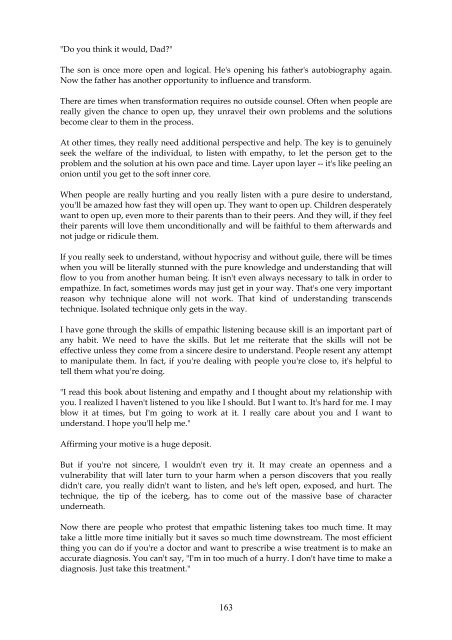Covey - The 7 habits of highly effective people
You also want an ePaper? Increase the reach of your titles
YUMPU automatically turns print PDFs into web optimized ePapers that Google loves.
"Do you think it would, Dad?"<br />
<strong>The</strong> son is once more open and logical. He's opening his father's autobiography again.<br />
Now the father has another opportunity to influence and transform.<br />
<strong>The</strong>re are times when transformation requires no outside counsel. Often when <strong>people</strong> are<br />
really given the chance to open up, they unravel their own problems and the solutions<br />
become clear to them in the process.<br />
At other times, they really need additional perspective and help. <strong>The</strong> key is to genuinely<br />
seek the welfare <strong>of</strong> the individual, to listen with empathy, to let the person get to the<br />
problem and the solution at his own pace and time. Layer upon layer -- it's like peeling an<br />
onion until you get to the s<strong>of</strong>t inner core.<br />
When <strong>people</strong> are really hurting and you really listen with a pure desire to understand,<br />
you'll be amazed how fast they will open up. <strong>The</strong>y want to open up. Children desperately<br />
want to open up, even more to their parents than to their peers. And they will, if they feel<br />
their parents will love them unconditionally and will be faithful to them afterwards and<br />
not judge or ridicule them.<br />
If you really seek to understand, without hypocrisy and without guile, there will be times<br />
when you will be literally stunned with the pure knowledge and understanding that will<br />
flow to you from another human being. It isn't even always necessary to talk in order to<br />
empathize. In fact, sometimes words may just get in your way. That's one very important<br />
reason why technique alone will not work. That kind <strong>of</strong> understanding transcends<br />
technique. Isolated technique only gets in the way.<br />
I have gone through the skills <strong>of</strong> empathic listening because skill is an important part <strong>of</strong><br />
any habit. We need to have the skills. But let me reiterate that the skills will not be<br />
<strong>effective</strong> unless they come from a sincere desire to understand. People resent any attempt<br />
to manipulate them. In fact, if you're dealing with <strong>people</strong> you're close to, it's helpful to<br />
tell them what you're doing.<br />
"I read this book about listening and empathy and I thought about my relationship with<br />
you. I realized I haven't listened to you like I should. But I want to. It's hard for me. I may<br />
blow it at times, but I'm going to work at it. I really care about you and I want to<br />
understand. I hope you'll help me."<br />
Affirming your motive is a huge deposit.<br />
But if you're not sincere, I wouldn't even try it. It may create an openness and a<br />
vulnerability that will later turn to your harm when a person discovers that you really<br />
didn't care, you really didn't want to listen, and he's left open, exposed, and hurt. <strong>The</strong><br />
technique, the tip <strong>of</strong> the iceberg, has to come out <strong>of</strong> the massive base <strong>of</strong> character<br />
underneath.<br />
Now there are <strong>people</strong> who protest that empathic listening takes too much time. It may<br />
take a little more time initially but it saves so much time downstream. <strong>The</strong> most efficient<br />
thing you can do if you're a doctor and want to prescribe a wise treatment is to make an<br />
accurate diagnosis. You can't say, "I'm in too much <strong>of</strong> a hurry. I don't have time to make a<br />
diagnosis. Just take this treatment."<br />
163


